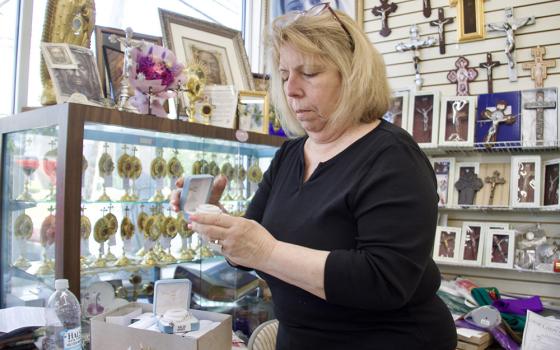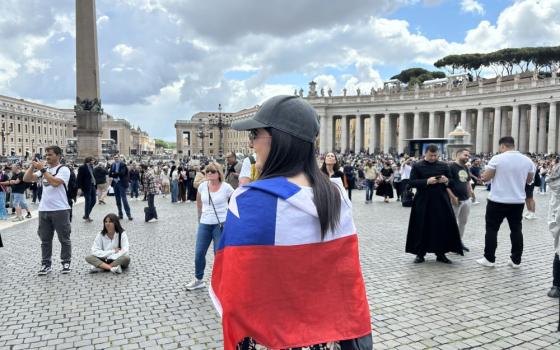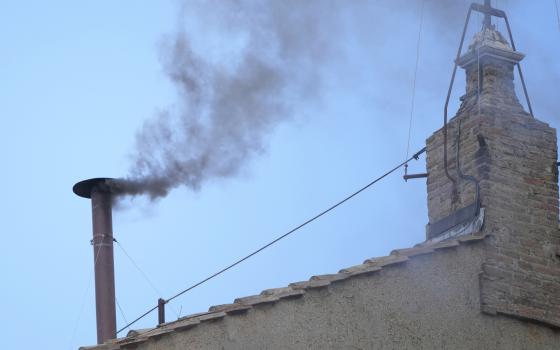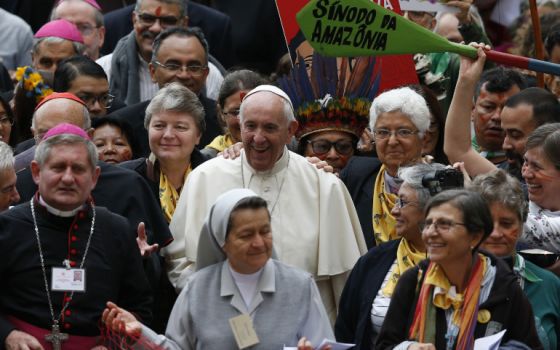
Cardinal Juan García Rodríguez of Havana, Cuba, approaches the Petriano entrance next to St. Peter’s Square to attend a general congregation meeting in the New Synod Hall at the Vatican April 25, 2025. (CNS/Lola Gomez)
Cardinal Juan García Rodríguez, archbishop of Havana, Cuba, said the mood inside the 2025 pre-conclave general congregations is marked not by political jockeying or regional maneuvering, but by a deep spiritual current — one shaped by the legacy of Pope Francis and a shared longing among the cardinals for unity.
"There is a desire to make grow what Pope Francis bequeathed with his life, with his words, with his examples," García said in an interview with the National Catholic Reporter, pointing to a collective commitment to continue the synodal path Francis championed.
Twelve years after the 2013 conclave that elected Francis — in which García's predecessor, Cardinal Jaime Ortega, quietly helped circulate among cardinals then-Cardinal Jorge Bergoglio's pivotal speech — Latin American voices continue to resonate at the heart of the church's most solemn deliberations.
Yet for García, the pre-conclave gatherings are not about orchestrated strategies or names whispered in corners. "The conclave and the general congregations are acts of faith," he said. "We believe that the Holy Spirit is there."
"We are men of the Catholic Church, successors of the apostles, and we believe in the church, which is one, given by Christ, because it has been sent to spread the Gospel to the whole world."
Advertisement
But what most impressed García this time was not the historical echoes of past conclaves — it was the present and future of the church, grounded in synodality, he said.
Synodality — a concept introduced by Francis and often defined as the church's new inclusive way of walking together and sharing church power between lay Catholics and the clergy — is, for García, not a novelty of Francis' pontificate, but a return to Gospel origins. "That is precisely the wonder of remembering the synodality that has been present in the Gospel for 2,000 years."
"I think that in the general line there is a desire for unity, a desire to maintain the legacy of Pope Francis, to maintain the synodality, which in the end is 2,000 years old, because Jesus Christ called 12 apostles and after he was resurrected, he sent them all over the world."
He said he senses, above all, a collective desire to nurture what the outgoing pope has sown.
"There is a desire to make grow what Pope Francis bequeathed with his life, with his words, with his examples," García said. "A desire to go to our neighbor, which ultimately is Christ, a desire for peace so necessary in the whole world."
For García, faith means trusting that even in a room full of differences — languages, experiences, pastoral priorities — the Spirit will speak, he said staring at a spot in the void with a contemplative glance, lightly stroking his humble wooden and wrought-iron bishop's pectoral cross on his shirt.
"I think that in the general line there is a desire for unity, a desire to maintain the legacy of Pope Francis, to maintain the synodality."
— Cardinal Juan García Rodríguez
García is a guest of the Jesuits at St. Ignatius of Loyola in Rome, who have brought many volunteers and lay missionaries to the poor Catholic communities in Cuba over the past 30 years. When he is not at the pre-conclave general congregations that are scheduled every morning from 9 a.m. to 1 p.m., García spends his Roman days at St. Ignatius, where he celebrates Mass every afternoon and confesses attendees.
"In those cardinals there are holy men, missionary men, charitable men, men who have lived or who fully live the faith," García said. "There may be many bets, there may be many opinions, but it is an act of faith in which the Holy Spirit manifests himself."
Asked whether the Latin American cardinals might vote as a unified block, he brushed aside the notion of strategic alliances. The conversations he has had, he said, have not focused on specific names or regional agendas.
"United, all the cardinals united in the common path, in what we aspire to."
What matters is the process itself, he said — one guided by prayer, dialogue and openness.
"There in the conclave, with prayer and conversation, well, with the light of the Holy Spirit, it will come out. The one who is already chosen by God."

New Cardinal Juan García Rodríguez of Havana carries his scroll after receiving the red biretta from Pope Francis during a consistory for the creation of 13 new cardinals in St. Peter's Basilica at the Vatican Oct. 5, 2019. (CNS/Paul Haring)
When pressed on the kind of profile the next pope should have, García offered a heartfelt answer.
"A mystical man, a missionary, a man of charity, a synodal man, a synodal successor, with affection for people, because in the whole world we all need affection."
That affection, he said, goes beyond gestures — it's about reaching the very essence of Christian witness.
"When the pope gives a hand, when the pope rides the children in the popemobile, when the pope writes to a person who is suffering, when the pope washes the feet of prisoners, he is showing affection. That is what Jesus Christ did."
Even in a world García acknowledges as wounded and fractured — echoing Francis' phrase, "a third world war fought piecemeal" — he said he remains rooted in hope. He believes that despite different expressions and paths, the desire for unity runs deep among the cardinals.
"There is a common stream, a common path. Not that it is exact, it is not uniform, but the common thing is, and the desire is, that we all go forward."
While the names of potential papal candidates are circulating quietly among analysts and observers, García was adamant that, for him and many of his fellow Latin American cardinals, the focus is less on personalities and more on spiritual readiness.
"I have it in my mind," he said of possible candidates. "But there in the conclave, with prayer and conversation, well, with the light of the Holy Spirit, it will come out. The one who is already chosen by God."
The National Catholic Reporter's Rome Bureau is made possible in part by the generosity of Joan and Bob McGrath.







